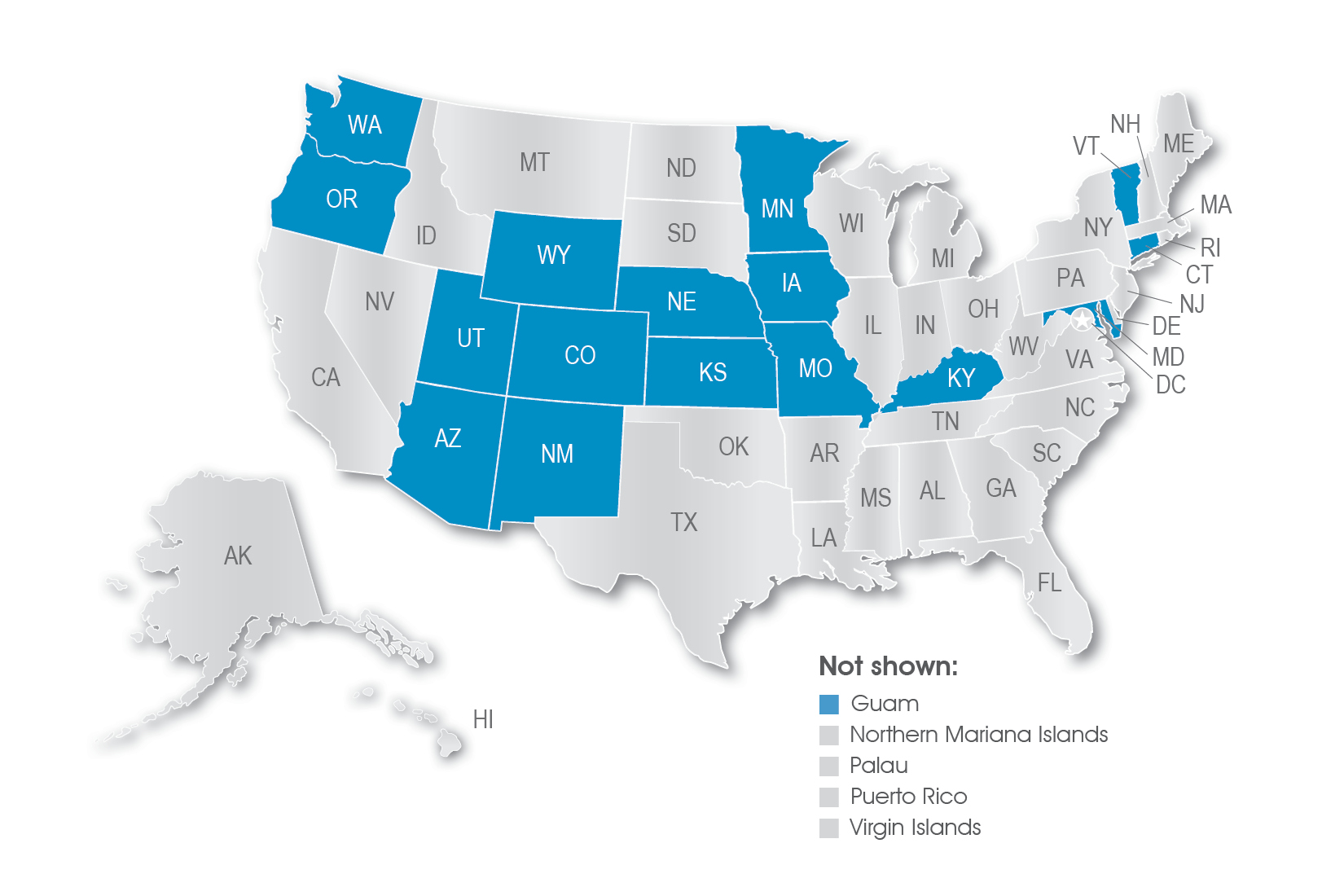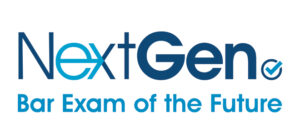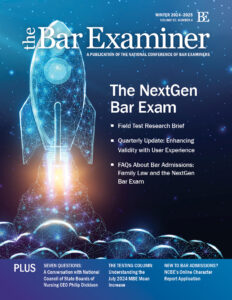This article originally appeared in The Bar Examiner print edition, Winter 2023–2024 (Vol. 92, No. 4), pp. 28–29.By Andreas Oranje, PhD, MBA
NextGen bar exam development continues to accelerate as we get closer to the operational launch in July 2026. This update covers recent key advancements, including the field test, delivery platform, grading process, adoption, and preparation for the prototype test.
-
- Working together, NCBE and law schools across the United States completed our first field test, which was conducted to test the first set of operational NextGen items. Over 4,000 people participated across 88 sessions at law schools nationwide. We debuted a total of 10 hours of content, where each participant answered 2 hours’ worth of multiple-choice/multiple selection and short and longer written-response questions. We are very grateful to the participating law schools that organized the administration and, of course, to the participants who signed up and showed up. Without this level of field testing, we couldn’t develop the NextGen assessment at such a high level of quality.
- We announced earlier that Surpass (surpass.com) will be our item bank, grading, and delivery platform. A trans-Atlantic assessment software company, Surpass has been in business since 1985 and provides services to several credentialing organizations, as well as users in higher education, K–12 classrooms, and various other markets. We are working closely to integrate their systems into our item development, registration/payment, and analysis/score-reporting workflows. The field test was a great opportunity for us to use the delivery platform on an operational scale, after multiple internal stress tests conducted throughout 2023 to prepare for the field test.
- The grading of written responses for NextGen will differ somewhat from current MEE/MPT grading practices. Surpass’s Secure Marker will be the platform all graders will access and use to grade written responses. It will have state-of-the-art grading features and all NextGen training, annotations, exemplars, and rubrics in one place along with the responses to be graded. We are using holistic rubrics to evaluate each response independently. We will no longer employ relative grading or attempt to achieve a particular distribution in each jurisdiction. We will also use universal double grading, meaning that at least two graders will evaluate each written response independently and that discrepant evaluations will be adjudicated. This will further strengthen the reliability of graded response scores and facilitate their independent contribution to total scores.
- We are excited when each jurisdiction announces adoption of the NextGen bar exam and gives law schools and students a path and timeline regarding the transition. We remain ready to support every jurisdiction, regardless of NextGen adoption status, by supplying technical information, providing external communications, conducting (in-person and online) presentations, and offering strategic advice. See https://www.ncbex.org/exams/nextgen for the most up-to-date information about jurisdictions that have adopted, the content of the new exam, and links to sample questions.
- Lastly, while the field test data is being analyzed, we are already setting our sights on the prototype exam. It will be the first full exam experience, a total of 9 hours across two days for those examinees using standard testing time and up to three days for extended-time examinees with accommodations. This research study will provide the basis for setting a score scale for the new exam, as well as for developing a concordance table and conducting standard setting. The concordance table can be used as a crosswalk from the current UBE or MBE score scales to the NextGen bar exam scale. Standard setting is an expert-judgment based activity to determine a reasonable range on the scale that corresponds to minimum competency for beginning lawyers. We will soon begin recruiting eligible participants to take the prototype exam in this paid study.
 Andreas Oranje, PhD, MBA, is the Managing Director of Assessment Programs for the National Conference of Bar Examiners.
Andreas Oranje, PhD, MBA, is the Managing Director of Assessment Programs for the National Conference of Bar Examiners.
About the Next Generation of the Bar Exam
Set to debut in July 2026, the NextGen bar exam will test a broad range of foundational lawyering skills, utilizing a focused set of clearly identified fundamental legal concepts and principles needed in today’s practice of law. The skills and concepts to be tested were developed through a multiyear, nationwide legal practice analysis, focused on the most important knowledge and skills for newly licensed lawyers. Designed to balance the skills and knowledge needed in litigation and transactional legal practice, the exam will reflect many of the key changes that law schools are making today. NCBE is committed to ensuring a systematic, transparent, and collaborative implementation process, informed by input from and participation by stakeholders, and guided by best practices and the professional standards for high-stakes testing.
For more information, visit nextgenbarexam.ncbex.org/.
Thank You to These Law Schools for Participating in NCBE’s NextGen Bar Exam Field Testing
In total, 4,124 participants from 88 law schools in 41 jurisdictions took part in field testing for the NextGen bar exam in January 2024. We are grateful to these law schools and to their students and alumni for the important contributions they made to the development of the next generation of the bar exam.
- American University Washington College of Law
- Arizona State University Sandra Day O’Connor College of Law
- Belmont University College of Law
- Birmingham School of Law
- Boston University School of Law
- Capital University Law School
- Chapman University Dale E. Fowler School of Law
- Charleston School of Law
- Cleveland State University College of Law
- Columbia University Law School
- Cooley Law School
- Creighton University School of Law
- DePaul University College of Law
- Duquesne University Thomas R. Kline School of Law
- Elon University School of Law
- Emory University School of Law
- Florida A&M University College of Law
- Georgia State University College of Law
- Gonzaga University School of Law
- Illinois Institute of Technology, Chicago-Kent College of Law
- Indiana University Maurer School of Law
- Indiana University Robert H. McKinney School of Law
- Lewis & Clark Law School
- Liberty University School of Law
- Loyola University Chicago School of Law
- Massachusetts School of Law at Andover
- Mercer University School of Law
- Mississippi College School of Law
- Mitchell Hamline School of Law
- New England Law | Boston
- Northern Illinois University College of Law
- Northern Kentucky University Salmon P. Chase College of Law
- Nova Southeastern University Shepard Broad College of Law
- Oklahoma City University School of Law
- Roger Williams University School of Law
- Saint Louis University School of Law
- San Joaquin College of Law
- South Texas College of Law Houston
- Southern University Law Center
- Southwestern Law School
- Mary’s University School of Law
- Thomas University College of Law
- Temple University James E. Beasley School of Law
- Texas Tech University School of Law
- The Ohio State University Moritz College of Law
- University of Akron School of Law
- University of Arkansas School of Law
- University of Baltimore School of Law
- University of California-Davis School of Law
- University of Chicago Law School
- University of Cincinnati College of Law
- University of Colorado Law School
- University of Dayton School of Law
- University of Denver Sturm College of Law
- University of Detroit Mercy School of Law
- University of District of Columbia David A. Clarke School of Law
- University of Georgia School of Law
- University of Hawaii William S. Richardson School of Law
- University of Idaho College of Law
- University of Illinois Chicago School of Law
- University of Kansas School of Law
- University of Kentucky J. David Rosenberg College of Law
- University of Louisville Louis D. Brandeis School of Law
- University of Maryland Francis King Carey School of Law
- University of Massachusetts School of Law – Dartmouth
- University of Memphis Cecil C. Humphreys School of Law
- University of Minnesota Law School
- University of Mississippi School of Law
- University of Missouri School of Law
- University of Missouri-Kansas City School of Law
- University of Nebraska College of Law
- University of New Mexico School of Law
- University of North Dakota School of Law
- University of Notre Dame Law School
- University of Pittsburgh School of Law
- University of South Carolina Joseph F. Rice School of Law
- University of South Dakota Knudson School of Law
- University of Texas at Austin School of Law
- University of Toledo College of Law
- University of Tulsa College of Law
- University of Wyoming College of Law
- Vermont Law School
- Washburn University School of Law
- Washington University School of Law
- West Virginia University College of Law
- Western New England University School of Law
- Widener University Commonwealth Law School
- Widener University, Delaware Law School

Contact us to request a pdf file of the original article as it appeared in the print edition.







